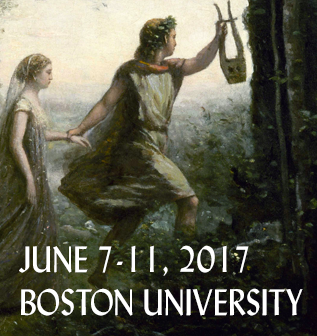
Situating Lyric, premier congrès mondial d’études lyriques, Boston, 7-11 juin 2017
Le réseau de recherche International Network for the Study of Lyric (INSL) organise le premier congrès mondial d’études lyriques à l’Université de Boston en juin 2017. Pour s’inscrire dans ce réseau ou pour participer au congrès, vous pouvez vous rendre sur lyricology.org. Même si le français fait partie des langues principales de l'INSL, les conférences et les discussions du Congrès de Boston se feront exclusivement en anglais. Il est également possible de proposer un panel de conférences.
Pour tout renseignement en français, vous pouvez contacter le secrétaire général du réseau, le prof. Antonio Rodriguez, Université de Lausanne, antonio.rodriguez@unil.ch
Situating lyric
First biennial conference of International Network for the Study of Lyric
Boston University June 7–11, 2017
The theory of lyric poetry is at a breakthrough moment: after a period of relative neglect, multiple new models and approaches have been put forth in recent years. Some emphasize basic features and constituents of lyric, others its functions, still others the shifting purposes of the label over time. There is increased interest in the relationship among lyric, poetry more generally, and other literary modalities and genres. At the same time, these new theoretical interventions are not consistently in conversation with each other, especially across national or linguistic lines. It is time to bring together scholars who are working toward a new understanding of the theoretical situation of lyric and poetry. Boston University with its rich traditions of literary study is an ideal site for hosting a transnational, historically wide-ranging, collaborative inquiry into the situation of both “lyric” and “poetry” in literary history, in world literature, and in other arenas of language use and art.
This conference is co-organized by the International Network for the Study of Lyric (INSL), a nonprofit association of scholars interested in the theory of poetry. Its purpose is to promote and encourage the interdisciplinary study of poetry, lyric and verse in various languages, forms, media, and functions. In particular, it aims at an interdisciplinary and international exchange of approaches, conceptual frameworks, and theoretical advances relating to the study of poetry and the lyric. In this spirit we intend to bring together in Boston scholars from different fields to discuss the situating of “lyric.” The conference language will be English.
We invite paper proposals that address the question of “Situating Lyric” from a wide range of perspectives including the following:
Situating lyric is a geographical and temporal matter.
- What is the place of “lyric” in the world, and/or its relation to “poetry”?
- How is lyric (and how has it been) variously situated in different cultural and national contexts and eras within Western literature?
- How are (changing or enduring) Western notions of lyric poetry to be situated vis-à-vis various individual or interacting poetic traditions of Asia, Africa, the Middle East, or indigenous cultures?
We welcome proposals that deepen or revise recent investigations into the situation of lyric in literary history.
- Is “the lyric” a continuous genre, a transhistorical mode, a post-hoc invention of recent vintage?
- Is it (has it been) important to identify a prototype of lyric that can be situated with respect to its outlying others – poetic forms or other speech genres that contrast with it?
- What roles have avant-garde or other anti-lyric movements played in situating lyric?
Discussions of lyric are strikingly (uniquely?) fragmented along linguistic and national lines.
Sophisticated and ambitious theories often take little account of work beyond the writer’s own language. At the same time, lyric has received significant attention in some fields beyond literary studies, such as philosophy.
- What is the disciplinary situation of lyric studies today?
- What are the disciplinary sites in which lyric is, or should be, investigated, and how do or could these disciplines shape our view of lyric?
- To what extent does, or should, the language in which the theorist writes constrain the theory?
- Is a world-literature approach to poetry studies possible? Desirable? If so, what could it look like, and what are the desiderata that might get us there? If not, what should we have instead, and why?
In lyric poems, the production and configuration of voice, addressee and perhaps a bystanding audience have often been felt to constitute a “situation” in themselves.
- What does a renewed look at the notion of the lyric’s communicative situation contribute to a broader theoretical understanding?
- Where should lyric poems be situated with respect to mimesis or fictionality on the one hand, “reality statement” or epideixis on the other?
- How should the formal features of poetry bear on these questions?
- Has the longstanding focus on the “speaker” of the poem (or “the lyric I”) led to a theoretical impasse, and in either case, what is the best way forward?
- Words implying orality (speaker, voice, tone, and so on) are entrenched in criticism of modern printed lyric poems. How consequential is (or isn’t) this slippage? Would it be worth the awkwardness and increase in jargon to strenuously ban all metaphors of speech?
- Is there still cogency to the idea that lyric poetry is poetry that has a special relationship to music, and if so, how can that relationship be specified?
- At the same time, the notion of a poem as a made thing, a fixed artefact, has a long history and seems to point away from a communicative framework. In what eras and places has the view of a lyric poem as a stable thing been strong, and with what relation to the idea of voice?
- Are there good arguments for not theorizing lyric poetry in communicative terms, however complex or nuanced we might endeavor to make those terms? If so, what are those arguments?
Please send an abstract of 300–500 words (including your affiliation) by February 17, 2017 to info@lyricology.org. Proposals for a group of 3-4 papers forming a panel also welcome.